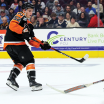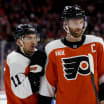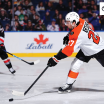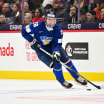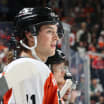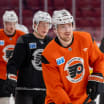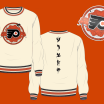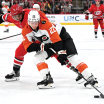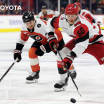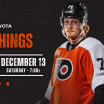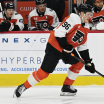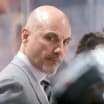With the start of on-ice work at training camp set to begin on Thursday, Flyers head coach Alain Vigneault met via Zoom with the media at midday on Tuesday. He discussed the basics of his vision for improving significantly upon last season's disappointing campaign and why he does not "believe last season represents who we really are" as a hockey team.
AV: "We All Have Something to Prove"
With the start of on-ice work at training camp set to begin on Thursday, Flyers head coach Alain Vigneault met via Zoom with the media at midday on Tuesday
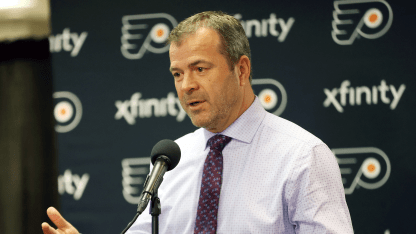
By
Bill Meltzer
philadelphiaflyers.com
There has been large-scale roster change since the end of last season. Multiple veteran defensemen have been added to the mix (led by Ryan Ellis, Rasmus Ristolainen and Keith Yandle). The team traded Jakub Voracek after 10 seasons in Philadelphia to the Columbus Blue Jackets in exchange for Cam Atkinson. One half of the goaltending tandem has been changed, with the Flyers signing veteran Martin Jones to be Carter Hart's partner in the Philadelphia net.
Vigneault expressed a belief these changes were necessary. However, he also knows that on-paper improvements mean nothing if the team does not gel.
"I believe right now everybody -- from coaches to the veteran Flyers players and the new Flyers players -- we all have something to prove. Now we need to get to work and get it done," he said.
"We need to come together as a team on the ice and off the ice. On the ice, systems, style of play, chemistry. We've got a lot of new players. We've got to bring them into the group. That's not going to be done by snapping our fingers."
The Flyers revealed several bits of bad news on the injury front shortly prior to the head coach's media availability.
Veteran center Kevin Hayes, who underwent core muscle surgery this spring, felt something was awry on Monday as he worked out with teammates at the Flyers Training Center in Voorhees. Yesterday, the player underwent abdominal surgery. He is expected to miss six to eight weeks.
Rookie hopeful right winger sustained a right ankle injury -- specifically a high ankle sprain -- when his lower leg and foot got twisted awkwardly underneath him as he went down to the ice on a check along the boards in Sunday's Rookie Game at the Flyers Training Center. He is out indefinitely.
"He's going to be out for awhile," Vigneault said. "Any time they call something an [indefinite] period of time, it means it's going to be a long time."
Vigneault speaks to media
Defenseman Samuel Morin had right knee surgery on Sept. 10 to remove loose bodies inside the knee. This is the same knee to which Morin suffered ACL tears in May 2018 and Nov. 2019. He is expected to be out six to eight weeks, dating back to Sept. 10.
"Injuries are part of the game. You need depth. With this being an Olympic year, the schedule is going to be challenging for every team. You're going to need depth to come up big for you during the season. Injuries are going to be part of it," Vigneault said.
Specifically, Vigneault said that 22-year-old rookie center Morgan Frost, a gifted playmaker who missed nearly all of the 2021-22 season due to shoulder surgery, would get the chance to show what he can do during Hayes' absences. Other players, such as Tanner Laczynski or Linus Sandin could also earn opening night roster spots following the loss of hard-shooting power forward Allison (who was not a lock to make the team but appeared to have an inside track).
With Morin out, the seventh spot on the defensive depth chart could be staked down in camp by a veteran player such as off-season additions Adam Clendening or Nick Seeler. Simultaneously, young players such as rookie hopefuls Cam York and Egor Zamula enter camp competing for playing time with veterans such as Keith Yandle (who carries a 922-game consecutive game Iron Man streak in the regular season into training camp).
In the bigger picture, Vigneault said, showing depth and resiliency in the face of injuries is part and parcel of being a good NHL team. There will be juggling of some previously planned line combinations over the first five days of practice and the start of the exhibition season but the overall plan to prepare for the season has not changed.
"At the start of camp, I'm going to try a couple different line combinations. If it works, great. That's positive for the team. If it doesn't, that's when coaching comes in and you make the adjustments that need to be made," the head coach said.
Here are four key takeaways from Vigneault's discussion of the team identity he aims to instill, how Hayes can be part of the process even while sidelined and why he believes that last season's poor results were an aberration but contains elements the team can use as learning experiences.
1. Restoring two-way identity; tweaking systems.
During Vigneault's first season in Philadelphia, the Flyers were the NHL's stingiest team in terms of shots allowed per game. The team ranked seventh in both goals against average and goals scored per game. These critical areas of improvement in 2019-20 went by the wayside last season, when the Flyers crashed to the bottom-ranked GAA (3.52) in the league.
The team's dismal play at both 5-on-5 and on the penalty kill (73.1 percent, ranked 30th) eventually dragged down an offense that entered the month of March ranked 4th in the league and finished 15th. Vigneault said he and general manager Chuck Fletcher agreed that both personnel and systems-related adjustments were needed.
"Chuck and I met a few weeks after the season, when we could take emotion out of it. Not going to get into details but we agreed changes needed to be made. Chuck said it best, 'If we want to get different results, we need to make some adjustments.' He went out and made them," Vigneault said.
"I've got a lot of confidence in the players that are back from last year. With the additions that we made, I really believe that we're going to be efficient. To have success in the NHL, when it's time to defend, you really have to be able to defend. We're going to be one of those teams that's good at defending."
In terms of systems, Vigneault predictably declined to reveal details of changes the coaching staff plans to implement. However he provided a general overview.
"We pored through a lot of tapes this summer. Obviously, you look at what the winning teams -- teams that went to the Final Four, etc. -- are doing defensively to be successful. There's a couple of adjustments we're going to make with our group in a couple of different situations," Vigneault said.
"As we go through the different zones with our team, there's a couple of little adjustments that we're going to make. We still want to be, obviously, a fast-paced team but there are definitely some elements in our defensive play that we need to improve on, and that we are going to."
What are the traits that are most common to NHL teams that are stingy defensively? It starts with gap control.
They layer their defenses so that opponents have to beat multiple players to get the puck to the net, and have minimal operating room through the neutral zone to gain controlled entries and attack in the areas between and below the dots. They take away back-door plays, avoid overloads and otherwise minimize the need for their goalie to scramble for desperation saves.
2. Hart's continued development.
Prior to last season, Carter Hart had never experienced any major adversity in his career. He had a stellar junior career. He debuted in the NHL at age 20. In his second NHL season, he set a franchise record for home save percentage and backstopped the team to within one win of the Eastern Conference Final.
The 2020-21 campaign turned out to be a nightmarish struggle for Hart. In addition to the poor defensive play in front of him (and now-former teammate Brian Elliott), there were too many games in which Hart himself did not perform up to par. This was especially true in March.
Over the last few weeks of the season, Hart began to correct some of the issues that had plagued him. Most notably, he made a glove-side adjustment and did a better job at staying on his angles. One his best starts of the season proved to be his final one (a 31-save gem in a 2-1 shootout win in Pittsburgh on April 15).
While neither Vigneault nor Hart want to dwell on last season, the coach said there are things that Hart can apply to getting back on track in 2021-22; both physically and mentally.
"I've told the players that I don't think last season represents who we really are. But there are some great lessons there and we need to learn those lessons to be better now and better in the future. Carter is the same way," Vigneault said.
Vigneault said that Fletcher showed the organization's faith in Hart by signing him to a three-year contract at a $3.979 million average annual value (AAV). Vigneault said that he's seen Hart play at a high level before and is confident the player will get back to such performances on a consistent basis.
3. Keeping Hayes involved during injury absence.
Recent weeks have been gut-wrenching for Kevin Hayes for reasons that have nothing to do with hockey.
His older brother, 31-year-old former NHL player Jimmy Hayes, passed away suddenly and unexpectedly at his home in Milton, MA, on Aug 23.
When dealing with the immediate throes of grief, being in the familiar environment of the rink with teammates as a support system and the physical routine of on-ice and off-ice training can be cathartic. There's never a good time for a player to suffer a significant injury that requires surgery and a lengthy absence from the ice, but the timing of Hayes' injury was especially tough.
Vigneault and Hayes have traveled a long road together as player and coach, both in New York and Philadelphia. On Tuesday, Vigneault expressed admiration and support for how the player plans to deal with the time away apart from the physical rehab.
"We texted back and forth a couple of times [Monday] when I found out about the news. He sounded pretty positive in one of the texts, to the extent that, 'AV, we got this early. I'd love to still be around the team during training camp, and do the meetings. We've got a lot of new faces and I'd like to help out.' I told him I told him I'm all for that. I wouldn't expect anything less from him. I want him around the team," Vigneault said.
For Hayes to offer to be a supportive teammate from a hockey standpoint even when he's unavailable to play-- at the same time teammates are there for him as needed on whatever basis he needs -- speaks to a player's character.
4. A return to normalcy, more or less.
The COVID-19 pandemic and the havoc it caused in the day-to-day lives of players and the ability of teams to hold practice affected the entire NHL. Everyone else was in the same boat as the Flyers.
Nonetheless, Vigneault said that returning to a semblance of normality can only be beneficial to the Flyers and to the league as a whole.
"It's real simple. We've got a camp this year and we've got exhibition games. I'm not going to address the past very much but we're sort of back to normal," Vigneault said.
"We're back to normal the way we were the first year that I came here. Players have had a normal summer of training. Players are getting tested, on and off the ice, to see where their conditioning is. Players are going to get the chance to show what they can do because we've got exhibition games. It's a normal season. It's planned to be an 82-game schedule. That's what I think everybody in hockey wants right now. Hopefully, that's what we're going to get moving forward."



